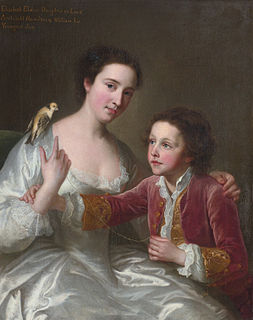Douglas is a common surname of Scottish origin, thought to derive from the Scottish Gaelic dubh glas, meaning "black stream". There are numerous places in Scotland from which the surname is derived. The surname has developed into the given name Douglas. Douglas is a habitational name, which could be derived from any of the many places so-named. While there are numerous places with this name in Scotland, it is thought, in most cases, to refer to Douglas, South Lanarkshire, the location of Douglas Castle, the chief stronghold of the Lords of Douglas. The Scottish Gaelic form of the given name is Dùbhghlas; the Irish language form it is Dúghlas, and Dubhghlas, which are pronounced Irish pronunciation: [duːɣləs]. According to George Fraser Black, in southern Argyllshire the surname is an Anglicised form of the surnames MacLucas, MacLugash.
Melanie is a feminine given name derived from the Greek μελανία (melania), "blackness" and that from μέλας (melas), meaning "dark". Borne in its Latin form by two saints: Melania the Elder and her granddaughter Melania the Younger, the name was introduced to England by the Normans in its French form Melanie. However the name only became common in English usage in the 1930s due to the popularity of Margaret Mitchell's 1936 novel Gone with the Wind and its 1939 film adaptation, as one of the novel's main characters was named Melanie Hamilton. The name's popularity increased until the 1970s, since remaining constant. Melanie was the 80th most popular name for girls born in the United States in 2007 and, as Mélanie, it was the 86th most popular name for girls born in France in 2004.
Anne, alternatively spelled Ann, is a form of the Latin female given name Anna. This in turn is a representation of the Hebrew Hannah, which means 'favour' or 'grace.'
Natasha is a name of Slavic origin. The Slavic name is the diminutive form of Natalia.
Isabel is a Romance-language feminine given name. It originates as the medieval Occitan form of Elisabeth , Arising in the 12th century, it became popular in England in the 13th century following the marriage of Isabella of Angoulême to the king of England. The modern French form is Isabelle, the Italian form is Isabella.
Carolyn is a female given name, a variant of Caroline. Other spellings include Karolyn, Carolyne or Carolynne. Caroline itself is one of the feminine forms of Charles.
Sarah Jane or Sarah-Jane is the name of:
Grace is a feminine given name from the Latin gratia. It is often given in reference to the Christian concept of divine grace and used as a virtue name.

Jane is a feminine given name. It is the English form of the Old French name Jehanne, which was an old feminine form of the male name Johannes or Ioannes, a Latin form of the Greek name Ἰωάννης (Iōannēs), which is derived from the Hebrew name יוֹחָנָן (Yochanan), a short form of the name יְהוֹחָנָן (Yehochanan), meaning "Yahweh is merciful".
Jane Howard may refer to:

Emma is a feminine given name. It is derived from the Germanic word ermen meaning whole or universal, and was originally a short form of Germanic names that began with ermen. Emma is also used as a diminutive of Emmeline, Amelia or any other name beginning with "em". It was introduced to England by Emma of Normandy, who was the wife both of King Ethelred II and later of King Canute. It was also borne by an 11th-century Austrian saint, who is sometimes called Hemma.
Ursula is a feminine given name in several different languages. The name is derived from a diminutive of the Latin ursa, which means "bear". The name has been rather uncommon in the English-speaking world, although its use has been recently influenced by the Swiss-born actress Ursula Andress. Urszula is the Polish version of the name whereas Uršulė is the Lithuanian version.
Nina is a feminine name with unclear etymology. It could come from the name Ninos, worn by the mythical founder Nineveh and the Assyrian empire. Patron of this name, Saint Nina (Nino), brought Christianity to Georgia.

Laura is a female given name in Latin Europe, Western Europe and North America whose meaning translates to "victor", and an early hypocorism from Laurel and Lauren.
Jean is a common female given name in English-speaking countries. It is the Scottish form of Jane. It is sometimes spelled Jeaine. It is the equivalent of Johanna, Joanna, Joanne, Jeanne, Jana, and Joan.
Gabrielle is the French feminine form of the given name Gabriel, which means "hero of God" or "God is my might" in Hebrew.
Caroline is a given name for women. It is derived from the male given name Karl (Charles). The common nicknames and variations include Carolyn, Carol, and Carrie.
Alternative spellings include Daiane, Dianne, Dianna, Dian, Diahann, Dyan, Dyanne and Dyane. See also Di and Diana



